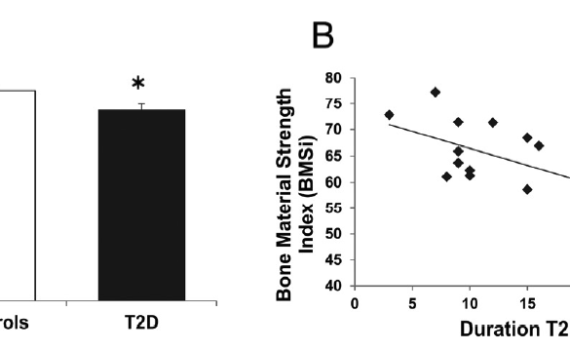Abstract Substantial evidence exists that in addition to the well-known complications of diabetes, increased fracture risk is an important morbidity. This risk is probably due to altered bone properties in diabetes. Circulating biochemical markers of bone turnover have been found to be decreased in type 2 diabetes (T2D) and may […]
TYPE 2 DIABETES
Abstract Diabetes and osteoporosis are both common diseases with increasing prevalences in the aging population. There is increasing evidence corroborating an association between diabetes mellitus and bone. This review will discuss the disease complications of diabetes on the skeleton, highlighting findings from epidemiological, molecular, and imaging studies in animal models […]
Abstract In addition to the loss in bone volume that occurs with age, there is a decline in material properties. To test new therapies or diagnostic tools that target such properties as material strength and toughness, a pre-clinical model of aging would be useful in which changes in bone are […]
Abstract Type 2 diabetes mellitus (T2DM) represents a complex clinical scenario of altered energy metabolism and increased fracture incidence. The C57BL/6 mouse model of diet-induced obesity has been used to study the mechanisms by which altered glucose homeostasis affects bone mass and quality, but genetic variations in substrains of C57BL/6 […]
Abstract While insulin-like growth factor I is a well-known anabolic agent in bone evidence is beginning to accumulate that its homologue, insulin, also has some anabolic properties for bone. There is specific evidence that insulin may work to stimulate osteoblast differentiation, which in turn would enhance production of osteocalcin, the osteoblast-produced peptide […]
Abstract Evidence indicating that adult type 2 diabetes (T2D) is associated with increased fracture risk continues to mount. Unlike osteoporosis, diabetic fractures are associated with obesity and normal to high bone mineral density, two factors that are typically associated with reduced fracture risk. Animal models will likely play a critical […]
Abstract CONTEXT: Skeletal deterioration, leading to an increased risk of fracture, is a known complication of type 2 diabetes mellitus (T2D). Yet plausible mechanisms to account for skeletal fragility in T2D have not been clearly established. OBJECTIVE: The objective of the study was to determine whether bone material properties, as […]
Abstract Although patients with type 2 diabetes (T2D) are at significant risk for well-recognized diabetic complications, including macrovascular disease, retinopathy, nephropathy, and neuropathy, it is also clear that T2D patients are at increased risk for fragility fractures. Furthermore, fragility fractures in patients with T2D occur at higher bone mineral density […]



